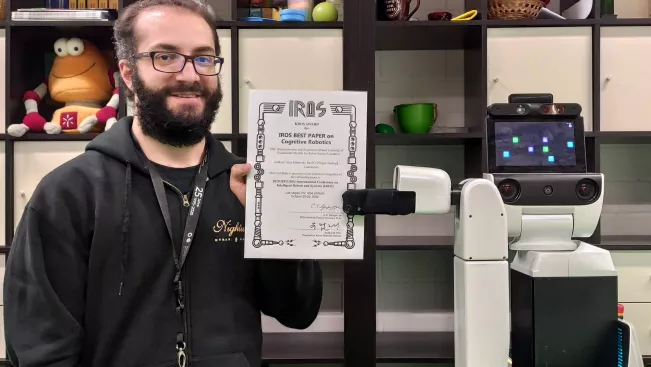Communications and Marketing
Domestic robots: their intelligence & ability to learn

Entitled "Representation and Experience-Based Learning of Explainable Models for Robot Action Execution", his prize-winning paper explores how to improve domestic robots by enabling them to analyse and learn from their own mistakes. Mitrevski himself puts it like this: "Just like people, robots execute various individual actions when they perform everyday tasks like cleaning a table. For instance, they take a cup off the table, bring it into the kitchen, put it away in a cupboard, and so on. Some of these actions don’t go to plan, and these are the times where we'd like to know what might have gone wrong. As robot programmers, we’re interested in error analysis because it lets us work on improving the robot. But it’s also important for the robot itself, because we want to enable it to learn from its mistakes. Just like human beings do."
Teaching robots to learn
However, errors can only be analysed if the robot has a conceptual understanding of the execution process: when it goes to grip a cup, for instance, it needs to know that it should approach the cup from the side or hold it firmly so that it doesn’t slide away or fall crashing to the ground. In practice, knowledge like this is either explicitly coded in the robot's software or lacking entirely. Neither is ideal because, in the first scenario, the robot is unable to adapt its behaviour independently, while in the second, it cannot even recognise and analyse its mistakes.
In his paper, Alex Mitrevski presents a method by which guided experimentation can teach a robot how to carry out certain actions in such a way that the lessons it learns convey conceptual knowledge about the action it has just performed. This allows the robot to predict whether it will succeed or fail if it goes about the action in a certain way. Mitrevski demonstrates the method using Lucy, a domestic robot made by Toyota: in the first situation, Lucy only makes attempts at gripping; in the second, she has to pull an object towards her.
Alex Mitrevski's cooperative doctoral project is being supervised by Professor Paul Plöger at H-BRS and Professor Gerhard Lakemeyer from RWTH Aachen University.